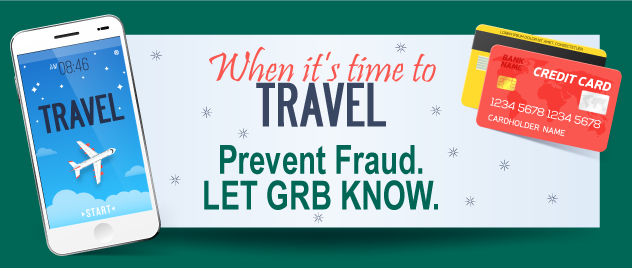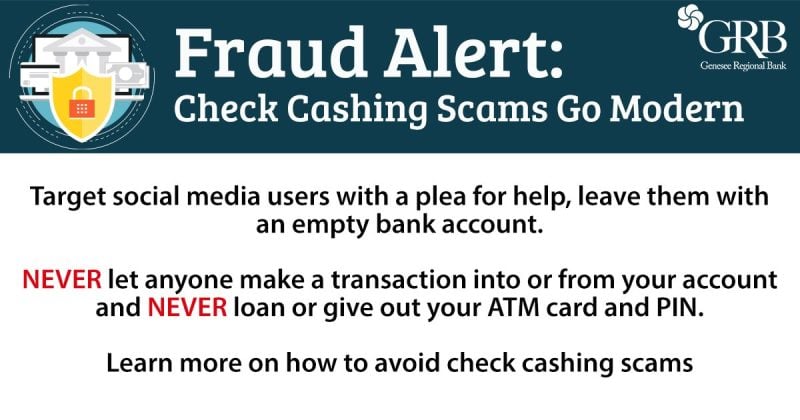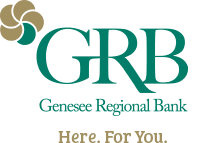The safety and security of your finances is a primary concern for GRB. Check this page for a variety of resources related to keeping your accounts safe. Use the QuickLinks below to find what you need.
How GRB Protects Your Information
GRB is committed to protecting clients’ personal information. GRBonline uses several different methods to protect users’ information, including multifactor authentication, secure tokens, and anomaly detection software. Additionally, all information within GRBonline uses the Secure Socket Layer (SSL) protocol for transferring data. SSL is a cryptosystem that creates a secure environment for information transferred between a web browser and a financial institution. All information transferred through GRBonlinehas 128-bit encryption; the highest level.
GRB will never request personal information by email or text message, including account numbers, passwords, personal identification, or any other confidential customer information. Fraudulent emails may appear as though they originate at GRB. DO NOT respond to any email that requests personal or confidential information. Do not click on any links in such an email.
If we contact you, it will be done in a manner that protects your personal information. We will clearly identify ourselves. If you contact us, we may ask verifying questions.
Traveling Outside the U.S. and Canada? Let GRB Know!

GRB currently blocks ATM and Debit card transactions originating outside the U.S. and Canada to help reduce the risk of fraud.
In order to ensure uninterrupted card access when traveling, please contact GRB prior to your trip. We can update your account to allow ATM and debit card transactions to select countries during your travel timeframe. This will ensure your card access remains uninterrupted.
This additional verification process helps ensure that our customers are able to remain safe and secure when using their cards. Please contact our customer service team at 585.249.1540 or stop in at a branch to make arrangements when you travel.
If at any time you suspect your cards may have been compromised, please contact our Fraud Center at 800.237.8990.
Additional Fraud Prevention Resources
How to Recognize and Avoid Phishing Scams
Excerpted from the Federal Trade Commission. Click here for the complete article from the FTC.
Scammers use email or text messages to trick you into giving them your personal information. They may try to steal your passwords, account numbers, or Social Security numbers. If they get that information, they could gain access to your email, bank, or other accounts. Scammers launch thousands of phishing attacks like these every day — and they’re often successful. The FBI’s Internet Crime Complaint Center reported that people lost $57 million to phishing schemes in one year.
Scammers often update their tactics, but there are some signs that will help you recognize a phishing email or text message.
Phishing emails and text messages may look like they’re from a company you know or trust. They may look like they’re from a bank, credit card company, social networking site, online payment website or app, or an online store.
Phishing emails and text messages often tell a story to trick you into clicking on a link or opening an attachment. They may
- Say they’ve noticed some suspicious activity or log-in attempts
- Claim there’s a problem with your account or your payment information
- Say you must confirm some personal information
- Include a fake invoice
- Want you to click on a link to make a payment
- Say you’re eligible to register for a government refund
- Offer a coupon for free stuff
What to Do If You Responded to a Phishing Email
If you think a scammer has your information, like your Social Security, credit card, or bank account number, go to IdentityTheft.gov. There you’ll see the specific steps to take based on the information that you lost.
If you think you clicked on a link or opened an attachment that downloaded harmful software, update your computer’s security software. Then run a scan.
How to Report Phishing
If you got a phishing email or text message, report it. The information you give can help fight the scammers.
Step 1. If you got a phishing email, forward it to the Anti-Phishing Working Group at reportphishing@apwg.org. If you got a phishing text message, forward it to SPAM (7726).
Step 2. Report the phishing attack to the FTC at ftc.gov/complaint.
Protect Your Personal Information from Identity Theft

Follow these suggestions to help protect your personal information:
- Always limit to whom you give your date of birth, mother’s maiden name, or other confidential information.
- Do not be afraid to question why someone needs your personal information.
- Minimize the amount of information you carry with you.
- Remove old deposits slips, blank checks, and other items with confidential information that you do not need to carry from your wallet or purse.
- Cancel credit cards that you don’t need.
- Always guard passwords and PINs.
- Limit the information on your personal checks to your name and address.
- Do not leave in your vehicle, especially in plain view, any items with personal information. This includes insurance cards, vehicle registration, wallets, purses, or laptops.
If you think your identity has been stolen visit: identitytheft.gov
Visit the Federal Trade Commission’s site for additional resources on consumer identity theft.
Check Cashing Scams

Please take steps to avoid becoming the victim of a check deposit scam. Younger accountholders with ATM and debit cards are often the targets of these criminals.
How it works
Fraudsters make contact with the victim (a helper), often via social media, and convince them that they need the helper’s assistance to cash a check. The story will be good (stranded outside the country, accounts frozen, IRS threat, etc.). Once the helper cashes the check, the fraudster asks for the helper’s ATM card and PIN number. Or, in a related scam, asks the helper to wire the money or buy gift cards and send them to him/her. For their trouble, the helper is paid a finder’s fee — often up to half of the money deposited, which appears quite generous. Unfortunately, once it is discovered that the check is fake, the helper has now become an accomplice to the crime. They are now responsible for making restitution for all of the money.
Don’t become a victim
To avoid becoming the victim in a check cashing scam always remember:
- Never let anyone use your account to facilitate a transaction, and especially if they request that you give them your ATM card and PIN, wire back funds, or purchase gift cards to pay them back. There is no legitimate reason for someone to pay or overpay you and then ask for the money back in another form.
- Never give out your ATM card or PIN. Never.
- Be suspicious of jobs that pay your expenses using this methodology. Secret Shopper scams are rampant. In this scam, a person is “hired” as a Secret Shopper and paid in advance, via check, for their expenses. Using those funds, they are instructed to test money transfer services like MoneyGram or Western Union. Or, they may also be instructed buy gift cards and send photos of them to the fraudster. Unfortunately, when the check is discovered to be fraudulent, the Secret Shopper is responsible for paying back all of the money from the fake check deposited into their account.
Credit Reporting Agencies
Equifax
P. O. Box 740241
Atlanta, GA 30374
To Report Fraud: (800) 525-6285
To Order a Credit Report: (800) 888-1111
Website: www.equifax.com
Experian
P. O. Box 2002
Allen, TX 75013
To Report Fraud: (888) 397-3742
To Order a Credit Report: (888) 397-3742
Website: www.experian.com
TransUnion
Fraud Victim Assistance Dept.
P. O. Box 6790
Fullerton, CA 92834
To Report Fraud: (800) 680-7289
To Order a Credit Report: (800) 888-4213
Website: www.transunion.com
Safely Managing Online Transactions for Your Business
As more financial transactions move online, fraud and identity theft are becoming a significant threat to financial institutions, businesses and individuals. Cybercriminals routinely employ new technologies and scams to secure information and data, and attempt fraudulent activities. Whether you are a business user or individual customer, it is important to remain vigilant regarding the use of the online environment to conduct financial transactions. This information is also provided to help you understand how GRB will conduct business in the event we need to contact you regarding your accounts:
The following represents GRB’s standard business practice regarding your online transactions:
GRB will never email, call, or otherwise ask you for key account information (i.e. username, password, electronic banking credentials, etc.). No matter how “urgent” the email may seem, resist the temptation to respond to it and provide any kind of account or personal information. If you ever have any questions about a request, please contact GRB directly.
Protect your identity
GRB also encourages its clients to protect themselves and their identity by following best practices for online security, including:
Monitor your accounts
In addition, we recommend that business account holders conduct regular monitoring and management of their accounts for fraudulent behavior. This could include making a list of the risks related to online transactions conducted by your business including:
Business controls
Businesses can also reduce fraud risk by putting the following controls in place:
EFT information
Federal regulations under the Electronic Fund Transfer Act provide consumers with some protections for electronic fund transfers. These federal laws establish limits on a consumer’s liability for unauthorized electronic fund transfers.
They also provide specific steps you need to take to help resolve an error with your account. Note, however, that in order to take advantage of these protections, you must act in a timely manner. If you believe your access information has been stolen or compromised, notify us immediately. Also, review your account activity and periodic statement and promptly report any errors or unauthorized transactions.
See the Electronic Fund Transfer disclosures that were provided at account opening for more information on these types of protections. These disclosures are also available from GRB – ask us and we will gladly provide you with a copy.
Even though there are protections in place to help consumers, keep in mind that the disruption of fraud will still be time-consuming. It requires a significant amount of effort to make your accounts correct and secure again. It is best to take steps to actively avoid giving cyber criminals the opportunity to make you a victim.
If you become aware of suspicious account activity, or receive any suspicious emails, you should immediately contact GRB at 585.249.1540.
Additional Resources to Help Your Business Prevent Fraud
Cybersecurity for Small Business website hosted by the Federal Trade Commission
Protecting Small Businesses website hosted by the Federal Trade Commission
CyberCrime website hosted by the Federal Bureau of Investigation
Internet Crime Complaint (iC3) page from the Federal Bureau of Investigation
